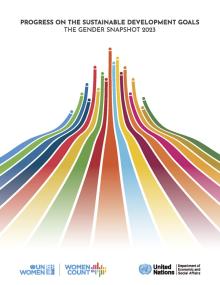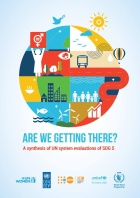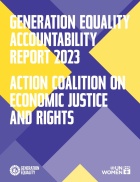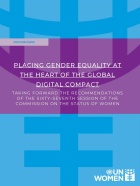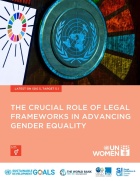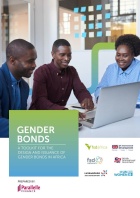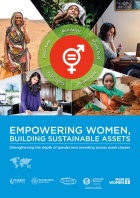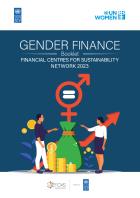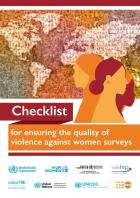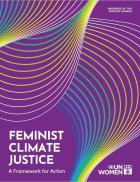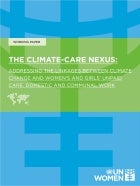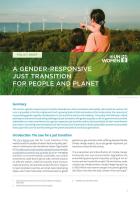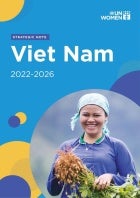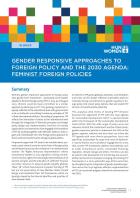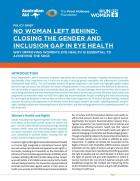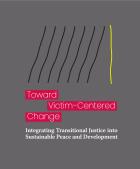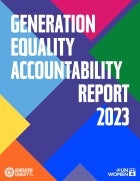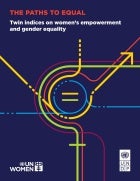Date:
Amidst stalled progress on achieving gender equality, the evaluation offices of UN Women, UNDP, UNFPA, UNICEF, and WFP conducted an inter-agency synthesis of UN system evaluations related to SDG 5 (gender equality). 295 evaluations were synthesized to generate evidence on what is working, evidence gaps, and lessons to advance SDG 5. The results are intended to serve as a catalyst for action by providing stakeholders with a series of implications to efforts to accelerate SDG 5.
Date:
Generation Equality is the world’s leading effort to unlock political will and accelerate investment and implementation on gender equality. Launched at the 68th session of the Commission on the Status of Women, this report presents the latest evidence on the implementation of commitments of the Economic Justice and Rights Action Coalition. The report demonstrates, through compelling evidence, that stakeholders are mobilizing new resources and are delivering game-changing results.
Date:
This position paper highlights key Commission on the Status of Women (CSW67) recommendations that can be incorporated in the Global Digital Compact. The paper suggests a dual approach: (1) inclusion of a stand-alone goal on gender equality that elevates freedom from technology-facilitated gender-based violence and discrimination; equitable educational and economic opportunities; and equal voice, leadership, and participation; and (2) robust mainstreaming of gender considerations across all parts of the framework.
Date:
This infographic on Sustainable Development Goal indicator 5.1.1 analyses the latest data for 120 countries, emphasizes the importance of strong legal frameworks that advance gender equality, showcases good practices by countries, discusses continuing legal gaps, and highlights priority actions to enhance progress.
Date:
This toolkit provides an overview of gender bonds in the African markets, bringing together recent case studies and existing resources. It encompasses both use of proceeds bonds and sustainability-linked bonds for sovereign and corporate issuers. With the goal of mobilizing capital to tackle gender gaps and stimulate economic growth in the region, the toolkit provides comprehensive support for gender-focused financial initiatives in Africa.
Date:
This report unpacks gender lens investing models and practices, while highlighting potential challenges and contradictions that they pose to feminist agendas. Drawing on case studies of funds and data, the report considers how impact funds can strengthen gender lens investing (GLI) to pave the way for inclusive and sustainable development that leaves no woman or girl behind.
Date:
UN Women and UNDP's Financial Centres for Sustainability Network (FC4S) joined forces to launch a comprehensive Gender Finance Booklet to advance gender equality within financial services.
Date:
This checklist is designed to help national statistics offices and other national research and data institutions and research teams to think through the steps needed to produce high-quality survey data on intimate partner violence—from the planning stages through analysis, report write-up, and dissemination of accurately interpreted findings.
Date:
This paper unpacks the concept of feminist climate justice. It provides guidance on how to transition to low-emission economies that are resilient to a changing climate, while recognizing the leadership of women and gender-diverse people in driving the change that is so urgently needed. It shows how the framework can be applied to the global food sector and analyses the major barriers to accountability for gender-responsive climate action.
Date:
Generation Equality is the world’s leading effort to unlock political will and accelerate investment and implementation on gender equality. Launched at the start of the 16 Days of Activism campaign in 2023, this report presents the latest evidence on the implementation of commitments made by the Action Coalition on Gender-Based Violence. The report provides compelling evidence that stakeholders are mobilizing new resources and delivering transformative results in this critical area.
Date:
This working paper sheds light on emerging efforts to address women’s and girls’ unpaid care, domestic, and communal work in a dramatically changing climate. It discusses the ways in which climate change and environmental degradation disrupt the care economy and increase and intensify women’s and girls’ unpaid work. The paper analyses emerging national efforts and concludes with recommendations for making caring for people and the planet a central concern.
Date:
This policy brief discusses robust pathways to a gender-responsive just transition and calls for governments and other stakeholders to make explicit commitments and actions, and to be held accountable for them. The brief also makes recommendations for actions and investments to build sustainable economies and societies that support the survival and flourishing of the planet and present and future generations.
Date:
As part of the UN Women Corporate Evaluation Plan, the Independent Evaluation Service (IES) conducted a meta-synthesis of UN Women evaluation evidence related to advocacy and communications from 162 corporate and decentralized evaluations undertaken by UN Women in 2018‒2022.
Date:
This brochure summarizes UN Women’s strategic note (SN) for Viet Nam, 2022–2026, which provides a roadmap for improving the lives of women and girls in Viet Nam. The SN articulates UN Women’s multi-year strategy, rationale, envisioned results, targets, and resource requirements for the next five years.
Date:
This policy brief synthesizes research findings, analyses, think pieces, and policy recommendations on feminist foreign policies and presents their nexus with the 2030 Agenda for Sustainable Development.
Date:
Vision impairment is both a contributor to gender inequalities and an outcome of gender inequality. This policy brief provides evidence of gender disparities in eye health and maps some forward-looking recommendations to countries to address gender dimensions in eye health and accelerate the achievement of the Sustainable Development Goals.
Date:
This report seeks to contribute to a more strategic approach to integrating transitional justice and sustainable development. It aims to inform policy discussions at the 2023 SDG Summit and beyond, drawing on the work and experience of members of the Working Group on Transitional Justice and SDG16+.
Date:
Generation Equality is the world’s leading effort to unlock political will and accelerate investment and implementation on gender equality. At the Generation Equality midpoint, this second accountability report demonstrates, through compelling analysis of new data, case studies, and inspiring examples, that Generation Equality is gaining momentum and providing a common platform to address the key gender equality issues of our time.
Date:
This report presents the latest evidence on gender equality across all 17 Sustainable Development Goals, focusing not only on the current level of progress, but also on the likelihood of achieving gender equality across the Goals at the current trajectory. Among this year’s recommendations is a call to significantly expand national investments and international financing in support of gender equality.
Date:
This report highlights the global challenges faced by women and provides a roadmap for targeted interventions and policy reforms. The report introduces two new indices: The Women’s Empowerment Index (WEI) measures women’s power and freedoms to make choices, while the Global Gender Parity Index (GGPI) assesses gender disparities in key dimensions of human development. Combined, these indices offer a comprehensive assessment of countries’ progress in achieving gender equality.
